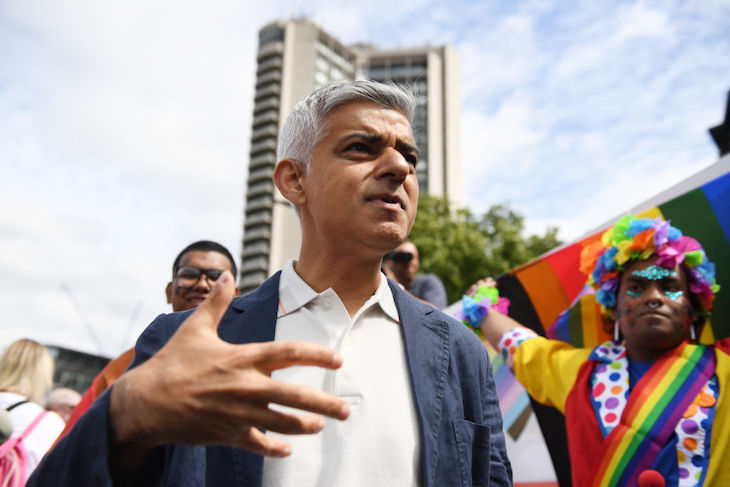Happy International Day Against Homophobia, Biphobia and Transphobia. The occasion has probably passed most people by – but the Mayor of London Sadiq Khan was quick to wave the rainbow flag this morning. Khan said it was ‘unacceptable’ that the UK has fallen to 17th place in a European league table of LBTQ+ rights. ‘LGBTQ+ people’s fundamental rights are under attack around the world,’ he warned. Khan continued:
‘If we’re not vigilant, the progress that has been made in the past century can be reversed. I urge the Government to take the concerns of the LGBTQ+ community seriously. My message to the LGBTQ+ community in London and around the world is clear: I stand with you – today and every day.’
Khan’s language was emotive, but as a trans person I find his depiction of LGBT rights – at least as far as the UK is concerned – hard to recognise. Yes, there are places around the world where gay and lesbian people face appalling oppression. In some countries, homosexual acts remain a capital offence. This is terrible – and it is right to speak out against them. But Khan is elected to serve London – and this is where his priorities must lie.
Rishi Sunak is clearly not transphobic
When it comes to London and, indeed, the UK, LGBT rights have come a long way in recent years. Khan warns that progress here risks going backwards, but in Britain there is little sign of that. Same-sex relationships have an equivalent status in law to heterosexual relationships, while both sexual orientation and gender reassignment are protected characteristics. Quite rightly, it is illegal to treat LGBT people less favourably than others – and nobody in authority is proposing to change that. Within the UK, at least, we have much to celebrate, not least that we can still – for the most part – speak freely and express our concerns about law and policy that affect LGBT people.
So why did Khan indicate that the UK is slipping down the rankings when it comes to LGBT rights? London’s mayor appears to be referring to the Rainbow Europe country rankings published every year by ILGA-Europe, the European Region of the International Lesbian, Gay, Bisexual, Trans and Intersex Association. Top of the table is Malta, followed by Belgium and Denmark. It’s perhaps no surprise that the table is propped up by the likes of Turkey and Russia. But what is Malta doing that we are not?
ILGA-Europe explain that the rankings are based on ‘how the laws and policies of each country impact on the lives of LGBTI people.’ Or – perhaps more accurately – how ILGA-Europe think that people like me are impacted by law and policy. That is not necessarily the same thing.
In its annual review this year, ILGA-Europe complains about ‘continued hostile reporting in [UK] mainstream newspapers’. They call it ‘anti-trans rhetoric’; for the most part, I’d call it evidence-based reporting and insightful comment. Along with newspapers, politicians in the UK also came under fire. The report says of the Prime Minister:
‘Incoming PM Rishi Sunak’s previous anti-trans statements, including “trans women are not women”, were covered by media after his appointment in October.’
Sunak is clearly not transphobic – and yet we live in a world, it seems, in which even saying something that most people agree with can be deemed unacceptable. Among the criteria ILGA-Europe uses to measure countries is ‘self-determination’ – being able to say which gender you are – and a ‘legal gender recognition procedure…for minors’. Does this last point mean sex changes for ten-year olds, on their own say-so? If so, on that – thankfully – the UK is failing to deliver. Let’s hope it stays that way, and recognise that – maybe – this is not a league table the UK wants to make it the top of.







Comments